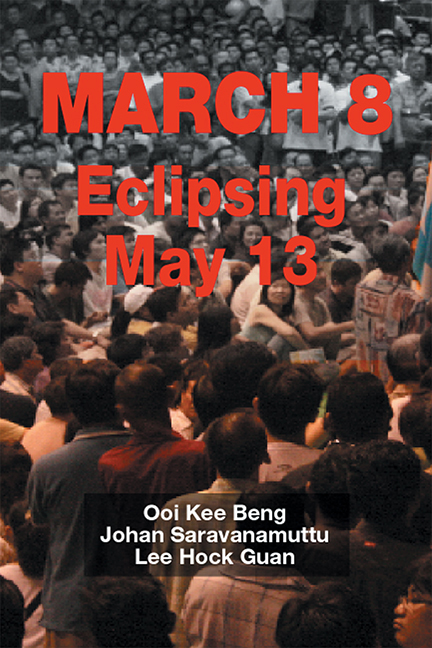Book contents
- Frontmatter
- Contents
- List of Tables and Charts
- Foreword
- Acknowledgements
- About the Authors
- Introduction
- 1 The Opposition's Year of Living Demonstratively
- 2 A Tectonic Shift in Malaysian Politics
- 3 The Ethnic Voting Pattern for Kuala Lumpur and Selangor in 2008
- Postscript: Anwar's Path to Power goes via Permatang Pauh
- Index
- Plate section
3 - The Ethnic Voting Pattern for Kuala Lumpur and Selangor in 2008
Published online by Cambridge University Press: 21 October 2015
- Frontmatter
- Contents
- List of Tables and Charts
- Foreword
- Acknowledgements
- About the Authors
- Introduction
- 1 The Opposition's Year of Living Demonstratively
- 2 A Tectonic Shift in Malaysian Politics
- 3 The Ethnic Voting Pattern for Kuala Lumpur and Selangor in 2008
- Postscript: Anwar's Path to Power goes via Permatang Pauh
- Index
- Plate section
Summary
Five months before the March 2008 General Election, Bersih, frustrated by the BN government's refusal to act on their demands, organized a demonstration to protest against gerrymandering, voter fraud practices, rampant irregularities in elections, and the misuse of public funds and facilities by BN for electoral campaigning. Without a doubt, successive BN governments have modified and manipulated the ‘first-past-the-post’ electoral system to benefit the incumbent ruling coalition. With the inequitable electoral system buttressed by BN-UMNO hegemonic domination of ethnic discourse and politics, it was generally assumed the Opposition would have little chance of denying BN its twothirds parliamentary majority and stop it from winning all the state governments, except for the Malay heartland states of Kelantan and Trengganu. Most observers reckoned it a foregone conclusion that the Abdullah-led BN would win its two-thirds parliamentary majority.
The dramatic electoral setbacks suffered by BN in the elections thus took almost everyone by surprise, including BN and the opposition parties. BN did win but lost its two-thirds majority in parliament and the Kelantan, Kedah, Penang, Perak and Selangor state governments to the Opposition (Khoo 2008). Various explanations have been given to account for the unexpected March 2008 election results. Ong (2008) singled out Abdullah's ineffectual leadership and his administration's failure to deliver on the campaign promises he had made in the 2004 election as the most important contributing factor. Welsh (2008) offered ten factors; including “reformasi spirit lives on”, “BN coalition failings and infighting”, effective use of new media by the opposition, better opposition cooperation and strategy, and backfire from the personal attack on Anwar Ibrahim, the de facto leader of the opposition. Undeniably, several factors contributed to the uncharacteristic change in the ethnic voting pattern and ethnic vote swing in the election. Furthermore, it was the varying degrees in the Malay, Chinese and Indian vote swing in the direction of the Opposition that resulted in the BN's electoral setbacks.
Some observers however cited the sizable ethnic vote swing for the Opposition as proof that there had been an important shift towards cross-ethnic allegiance voting in the 2008 election, unlike in past elections where voter behavior was usually dictated by a greater preference for the party representing one's ethnic group.
- Type
- Chapter
- Information
- March 8Eclipsing May 13, pp. 80 - 121Publisher: ISEAS–Yusof Ishak InstitutePrint publication year: 2008

